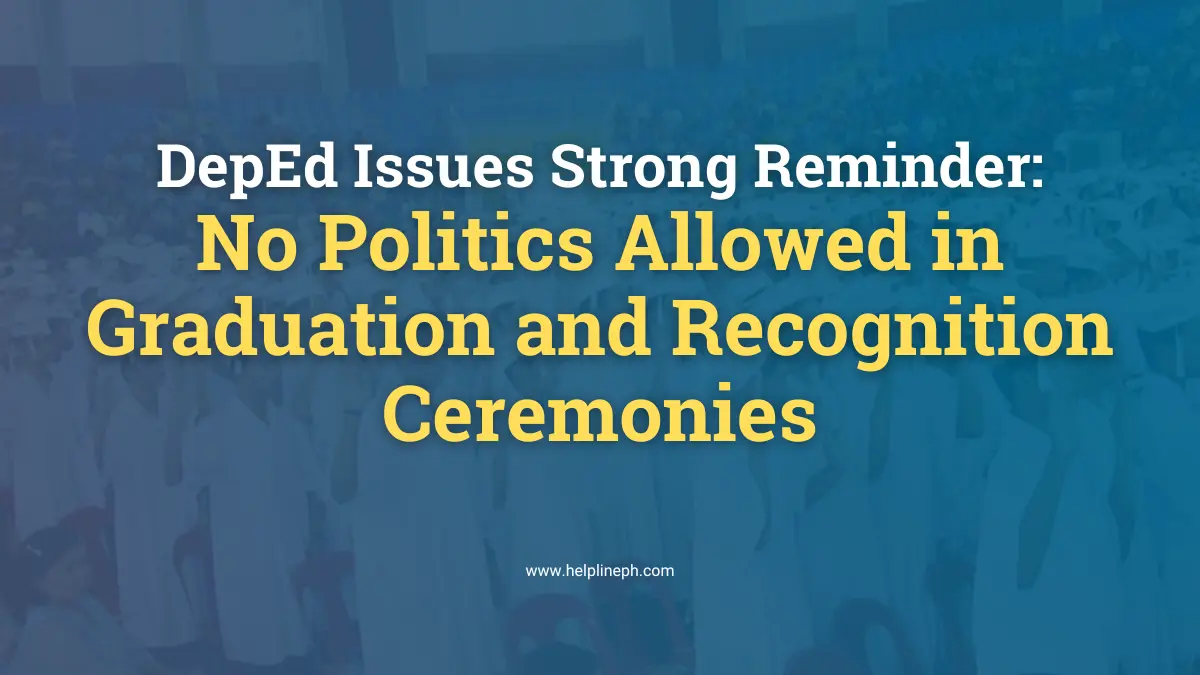Why Did DepEd Release This Reminder?
According to Mark Kevin Arroco, a project development officer at DepEd Region 5 (Bicol), graduation and recognition ceremonies are for students — not for politics. The agency wants to highlight the hard work and success of learners and avoid turning school events into political campaigns.
Arroco said,
“We want to give highlights to the students and their accomplishments and not be used as a venue for a political campaign.”
This means candidates running for office are not allowed to attend these events as guests of honor or speakers.
What Are the Rules?
DepEd Region 5 issued a memorandum reminding all public elementary and secondary schools to follow these guidelines. While private schools are not directly under DepEd, they are encouraged to follow the same rules to keep events focused on the students.
The end of the school year in the Bicol Region is scheduled for April 14-15, 2025, which is why this reminder is very timely.
Gilbert Sadsad, the DepEd Regional Director, also emphasized that DepEd Order 48 series of 2018 must be followed. This order forbids DepEd staff from participating in any political activities, including electioneering and partisanship. These rules are backed by the Philippine Constitution and Civil Service Commission (CSC) regulations, which require government employees to stay neutral during elections.
Why Should Schools Stay Away from Politics?
The purpose of keeping politics out of school ceremonies is to protect the integrity and meaning of these events.
Graduations and recognition days are special moments for students and their families. Allowing political figures to speak or be honored could shift the attention away from students and use the event to gain votes.
DepEd wants schools to focus on celebrating student achievements, not on promoting political agendas.
What Will Happen If Someone Breaks the Rule?
DepEd warns that any complaints about political activities during school events will be taken seriously. These complaints will be handled by the appropriate DepEd offices, and those who break the rules could face penalties.
Director Sadsad stressed that these actions are part of DepEd’s effort to support clean and honest elections.
The Importance of Non-Political Graduation Ceremonies
Keeping politics out of school events shows respect for students’ hard work. Here’s why this policy is important:
- Students Deserve the Spotlight – Graduation is a reward for students’ effort and growth, not a time for political speeches.
- Protecting Students from Influence – Schools should be a safe space, free from political pressure or influence.
- Upholding Trust in Public Schools – When schools stay neutral, people trust them more.
- Supporting Fair Elections – By not allowing candidates to use school events for exposure, DepEd helps promote fairness in elections.
Personal Reflection: Why I Support DepEd’s Reminder
As someone who has attended many graduations, I believe this reminder is very important. Graduation day is one of the proudest moments in a student’s life. I remember my own graduation — my family was so happy and proud. If a politician had used that day to talk about their plans or campaign, it would have taken away from the joy of the moment.
I’ve also seen events where politicians attend and suddenly the focus changes — the speeches become about politics, not about students. That’s why I think DepEd is right to remind everyone: let the students shine. They worked hard for that day, and they deserve to be the center of attention.
What Can Schools Do to Follow the Policy?
Here are some simple ways schools can avoid political influence during their events:
- Do not invite politicians or candidates as guest speakers or special guests.
- Focus the program on students — highlight their achievements, stories, and talents.
- Remind teachers and staff not to wear campaign materials like shirts, pins, or stickers.
- Avoid political banners or posters inside the school premises during ceremonies.
- If any political figure is a parent, make sure they attend as a parent only, not as a candidate.
Frequently Asked Questions (FAQs)
Can politicians attend graduation if they are relatives of graduates?
Yes, but only as regular guests or family members, without giving speeches or promoting their campaign.
What happens if a school invites a candidate as a speaker?
If this happens, a complaint can be filed, and DepEd may investigate. The school head and organizers could face disciplinary actions.
Why are private schools encouraged to follow this rule?
Even though private schools are not directly controlled by DepEd, following this rule promotes fairness and keeps the focus on students, just like in public schools.
Are teachers allowed to support candidates outside of school?
Teachers, like other government employees, must remain neutral in public and avoid showing support for any candidate during official school activities.
How can parents report violations?
Parents can report violations by contacting DepEd’s regional offices or division offices. There are official channels for complaints, including hotlines and emails.
Final Thoughts
Graduation and recognition ceremonies are special, once-in-a-lifetime moments for students and their families. These events should not be turned into political shows. By following DepEd’s reminder to keep politics out, schools are honoring students’ hard work and protecting the meaning of education.
If you are a teacher, school head, or even a parent, let’s work together to make sure our school ceremonies are about the students — and only about them.
Let’s give our students the celebration they truly deserve!






